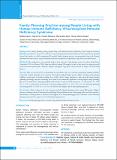Please use this identifier to cite or link to this item:
https://hdl.handle.net/20.500.14356/1188| Title: | Family Planning Practice among People Living with Human Immuno Deficiency Virus/Acquired Immune Deficiency Syndrome |
| Authors: | Upreti, Radhika Oli, Upanish Bhattarai, Sailesh Baral, Dharanidhar Poudel, Ishwori Sharma |
| Citation: | UpretiR., OliU., BhattaraiS., BaralD., & Sharma PoudelI. (2020). Family Planning Practice among People Living with Human Immuno Deficiency Virus/Acquired Immune Deficiency Syndrome. Journal of Nepal Health Research Council, 18(1), 10-15. https://doi.org/10.33314/jnhrc.v18i1.1775 |
| Issue Date: | 2020 |
| Publisher: | Nepal Health Research Council |
| Article Type: | Original Article |
| Keywords: | Family planning practice People living Human Immuno Deficiency Virus |
| Series/Report no.: | Jan-Mar 2020;1775 |
| Abstract: | Abstract Background: Family planning among people living with Human Immuno Deficiency Virus/Acquired Immune Deficiency Syndrome is proved to be effective in preventing Human Immuno Deficiency Virus transmission through sexual and mother to child transmission.We studied family planning practice among people living with Human Immuno Deficiency Virus/Acquired Immune Deficiency Syndrome at reproductive age and its associated factors. Methods: We conducted a cross-sectional study in four anti retro viral therapy centers in eastern Nepal from September 2015 to February 2016. Data was collected among 200 samples by face to face interview using pretested semi-structured questionnaire. Bivariate analysis and logistic regression was performed to analyze the associated factors. Results: Fifty one percent (51%) of participants in reproductive age were currently using family planning methods with male condom being the most common. On bivariate analysis, higher income, higher education, having living children, involvement in decision making, low fertility desire, longer duration in anti-retroviral therapy, family planning knowledge and past counseling were found to be statistically significant in having higher family planning practice. In multivariate analysis,participants with duration in anti-retroviral therapy for 1- 4 years(AOR: 9.2, 95% CI: 1.7-47.5), both spousal involvement in decision making (AOR:37.1, 95% CI: 6.5-211.9) and family planning counseling (AOR: 3.4, 95% CI: 1.0-11.3) were found to have higher odds of family planning practice. Conclusions: Male condom is the most common method of family planning practice among HIV patients. Higher income, education status of both partners and having living childrens are the encouraging factor for better practice. Involvement of both partners is associated with higher use of family planning practices. Duration of anti-retroviral therapy use has positive impact on use of family planning practices. Keywords: Family planning practice; people living; Human Immuno Deficiency Virus |
| Description: | Original Article |
| URI: | http://103.69.126.140:8080/handle/20.500.14356/1188 |
| ISSN: | JNHRC Print ISSN: 1727-5482; Online ISSN: 1999-6217 |
| Appears in Collections: | Vol. 18 No. 1 (2020): Vol. 18 No. 1 Issue 46 Jan-Mar 2020 |
Files in This Item:
| File | Description | Size | Format | |
|---|---|---|---|---|
| 1775-Manuscript-14298-1-10-20200420.pdf | Fulltext Article. | 219.89 kB | Adobe PDF |  View/Open |
Items in DSpace are protected by copyright, with all rights reserved, unless otherwise indicated.
